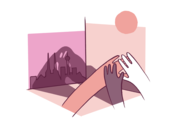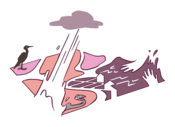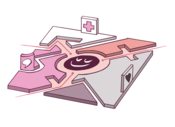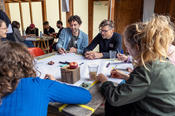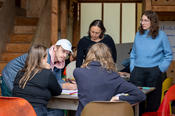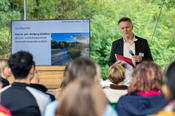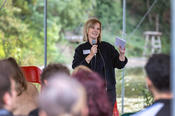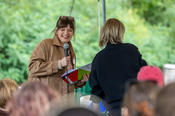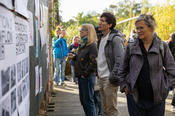Upgrade your Science – Closing event of the first funding cohort of the TD-Lab Funding Program
The closing event of the TD-Lab Funding Program on September 17, 2025 served both to reflect on its own work and to present the results to a larger audience. 72 guests accepted the invitation to the Floating University campus.
"Through the TD-Lab, we have not only developed the kiosk as a research practice, but also learned how much potential there is in the process when you share knowledge instead of managing it." (Laura Margarete Bertelt, Moritz Ahlert from the project Recording Kiosk of Solidarity)
Eleven projects in the first cohort of the TD-Lab Funding Program were funded with up to 10,000 euros each in material costs from January 2025 to July 2025. Six projects worked on the main topic of water and worked on questions, e.g. how dancing promotes education for sustainable development in school lessons or how neighborhood initiatives can contribute to heat protection in cities. In addition, there have been projects to develop an app to support patients with rare diseases or a user-centered database for journalists, politicians and civil society organizations who want to use the speeches of all state parliaments for their work. All projects are presented here.
The closing event of the TD-Lab Funding Program on September 17, 2025 served both to reflect on its own work and to present the results to a larger audience. 72 guests accepted the invitation to the Floating University campus.
Space for reflection for the funded projects
Before the Floating University was opened to the guests the scholarship recipients had the opportunity to reflect on their experiences of the last six months in the group. For this purpose, the groups were instructed at three thematic tables. They discussed their projects in relation to 1.) individual learning and experiences through work with non-academic actors, 2.) Effects of the projects externally on research and society and 3.) the framework conditions that the TD-Lab Funding Program offered the grantees.
For many of the project participants, the project was their first that they had carried out with non-academic actors. In all cases, the cooperation brought many advantages individually and also for research. In particular, the new impulses and the immediate compatibility of one's own research were emphasized. Despite the short duration, it was possible to develop concrete products with which the participating practice partners can continue to work directly. For example, three prototypes for artistic installations for collecting rainwater and a guideline for establishing reflexive-research-based lesson development by teachers were developed. However, the projects' own research work has also provided a new dynamic and new foundations for further research questions and approaches. When reflecting on the framework conditions of TD-Lab Funding, it became very clear that they were rated better and worse depending on the initial situation of the project managers. For some, the short run time was intense, but also very effective, as it also integrated well into other workflows. Others had the feeling that after the six months it could have really started. Overall, however, the TD-Lab Funding Program was seen by everyone as a special opportunity to try out participatory and transdisciplinary research and to try out formats. It was valued as an enrichment in terms of new perspectives and research content as well as the expansion of one's own networks.
"For me, collaborating with artists and public officers is like bursting a "soap bubble" in which I'm immersed in my daily university research routine. The simplest questions make me wonder: what part of everything we research has value for others, and how can I refocus my efforts so that those aspects become prominent in the design of my research projects?" (Laura Betancur Alarcón, Project Infrastructural Rhythms)
Space for the presentation and celebration of the funded projects
In the subsequent public part of the event, the projects had the opportunity to introduce themselves, make new contacts and, above all, be celebrated. Prof. Dr. Wolfgang Schäffner (Humboldt University of Berlin) opened the event on the unique grounds of the Floating University. He emphasized the importance of excellent research to conduct research together with non-scientists and to recognize, understand and integrate their expertise and perspectives into the research process. This requires incentives, appreciation and, last but not least, support.
In two short panels, the grantees presented their work and discussed their experiences with this type of research. In addition, the guests had the opportunity to meet the scientists and co-researchers at project booths in the Heukino of Floating and to enter into a personal exchange.
The festival was rounded off by two guided tours of the unique grounds of the Floating University. In the basin of the former water retention basin of Tempelhof Airport, an ecological-cultural project and a place of learning has been created, which is dedicated to the protection of nature and the environment and civil society and artistic exchange with innovative approaches.
"We would like to thank the Floating University for the cooperation, Josefa Kny for the professional support in the conception and moderation of the accompanying program, Prof. Dr. Wolfgang Schäffner for the inspiring speech at the closing event, Simon Brunel and Nicolas Pennetier from Atelier Limo for the fantastic photo documentation during the entire duration of the funding; Stefanie Leinhos for very nice illustrations for public relations, Dr. Audrey Podann and the TD-Lab team for their commitment and great support, and above all the scholarship recipients, who have already made the TD-Lab Funding Program a success in its first funding period with their joy of experimentation, openness and curiosity." (Nadin Gaasch, Dr. Ina Opitz, TD-Lab of the Berlin University Alliance)

